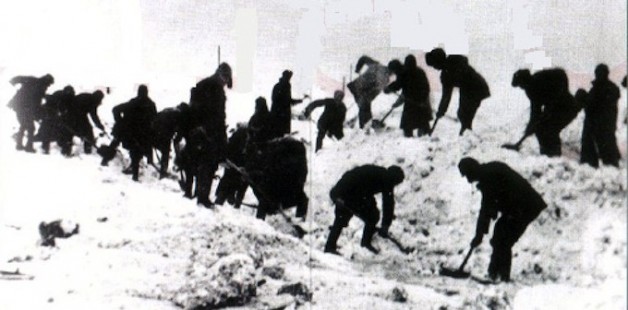In the German film As Far as My Feet Will Carry Me, a number of German soldiers are captured by the Soviet military and are brought into a labor camp deep within the borders of the Soviet Union. Separated from any city, forest, or free-flowing water, the camp itself has no fencing and few guards, since a prisoner could live but a few hours in the surrounding cold, ice, and snow. Most, if not all, of the prisoners are brought to the camp to work until they die. Life in such a situation would surely be hopeless.
One German officer, however, in the hope of escape, stockpiles food, clothing, and supplies, and when the time is right walks away from the prison. For years he flees from the Soviet military as he travels from the Arctic Circle down through the larger part of Eastern Russia. When he finally arrives at the southern border of the Soviet bloc, he is taken prisoner by the Iranian government as a suspected Russian spy. Throughout these tribulations, what kept this man going was his hope in returning home and finding his family. His hope was not something that he carried along with him in his journey, but was the sole source of his strength along the way.
When we use the word hope today, what we usually mean is a desire that will not quit. It is a feeling that what we want can be had, and our desire to have it will not be curtailed by present limitations. The hope of the German officer who fled, for example, could be his reliance upon himself and his determination to achieve his goal to return home. The stronger his confidence in his capabilities, the stronger his hope would be.
Self-reliance, however, is not the best way to define hope. Hope is a desire that goes beyond a person and his capabilities, whether he has confidence in himself or not. St. Thomas Aquinas defines hope as a movement towards a future good that is difficult but still possible to obtain. The good we want is difficult because we desire things beyond what we can achieve on our own. The good is still obtainable because our natural hopes ultimately fall under a supernatural hope that we have in God. God is infinitely beyond us, but we still believe that unity with him is an attainable good because of our faith in his promises. This is why St. Paul tells the Romans:
We know that the whole creation . . . and we ourselves, who have the first fruits of the Spirit, groan inwardly as we wait for adoption as sons, the redemption of our bodies. For in this hope we were saved. Now hope that is seen is not hope. For who hopes for what he sees? But if we hope for what we do not see, we wait for it with patience. (Rom 8:22–25)
Even if we do not presently see it, our ultimate goal is our salvation, won for us by Christ as adopted sons of God. Suffering and trial need not lessen our hope in this salvation. We hope in heaven not because we need a reminder of our limitations, but because of the faith we have in the one who brings us to this final end. God offers us salvation, union and eternal happiness with himself. He does this not because of who we are or what we expect, but because of who he is and his love for us. Salvation is a gift beyond our measuring, but not beyond our hope.
✠
Image: Prisoners Working in a Gulag







